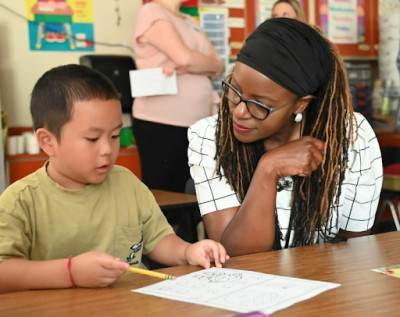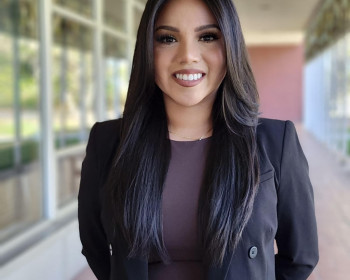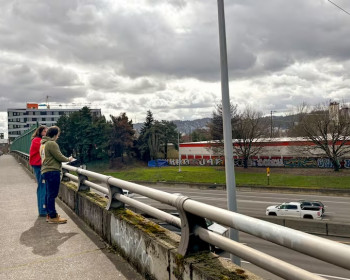A Champion of Equity and Excellence for Oregon’s Schools
Charlene Williams EdD ’15 leads the Oregon Department of Education as a “warm demander” of student, teacher, and educational system success.

Credit: Albert Rosales-KorreaAs a young, high-achieving STEM student in Wilmington, North Carolina, Charlene Williams EdD ’15 received a challenge from one of her teachers: “If other people think women and people of color don’t do well in math, what are you going to do about it?”
A fallen french fry helped Williams figure out the answer. “My precalc teacher slipped on a french fry in the cafeteria, and ended up too injured to teach. I had to take over our class, because the substitute teacher couldn’t teach precalc.”
Thanks to that french fry, Williams discovered she not only loved doing math but that she also loved teaching math. Over time, she realized something else that shaped her career path. “I always escalate things. If I can make a difference in the classroom, what about as a school leader? Or as a district leader? How do I help those most marginalized by the system?”
Putting Theory Into Practice
Questions of equity and purpose brought Williams to Lewis & Clark’s doctoral program in educational leadership. While she was a student in the program, she was awarded a principalship at Portland’s Roosevelt High School. The opportunity altered her pace through graduate school. “Lewis & Clark was really supportive. I wasn’t leaving the program. Instead, I was partnering with my professors around problems of practice as they were coming up for Roosevelt staff.”
Ultimately, the transformational work she first undertook at Roosevelt became a story she shared with others. “We were educators. But we were also people who cared deeply about the community we were trying to serve.” Her dissertation explored the problem of lowered expectations and loss of hope, by listening to students as they described their responses to a school system that had been inconsistent, punitive, and inauthentic. She documented what students—particularly Black boys in their teens—articulated about teachers’ expectations of them. From the students’ perspective, teachers need to be “warm demanders” who express care and interest for individual students while also holding students to high academic expectations.
Leadership Focus Areas
In her role as director of Oregon’s Department of Education, Williams draws on her experience in urban and suburban districts while applying lessons honed at Lewis & Clark. “We should enter our leadership roles with open hearts and minds, clear on our why. ‘Why are we in leadership?’ That keeps us focused on making a difference, measuring the impact, moving resources so that students are going to do better and be better. With that North Star, we can build the paths needed by our schools, districts, and state so our students can be successful.”
She’s bringing three interrelated areas of focus to the state’s work:
- Academic excellence—Williams defines this as ensuring students have requisite skills to be college- and career-ready, and also to be good human beings. “Oregon needs to be graduating global citizens who are curious about others and can be in community with others.”
- Belonging and wellness—“When cortisol is high, cognition is low,” Williams observes. “So how do we lower cortisol? How do we create safe conditions for everyone in our schools to be relaxed and paying attention to learning?”
- Accountability—The Oregon Department of Education is creating a new accountability framework, mandated by House Bill 2656, which is slated to be approved and implemented by September 2024. Under Williams’s leadership, this process involves defining accountability in ways that are measurable and meaningful.
With regard to that last point, Williams says, “We need to be clear about what we mean by accountability and who is accountable to whom. But we also need to be clear about how we can align our efforts, resources, and goodwill in a way that actually tracks the outputs. We cannot just point to the teacher as accountable for students’ progress. It’s a matter of asking, ‘How have we wrapped resources and supports around the school system as a whole?’ And we need to shift accountability from punitive to aspirational.”
While Williams recognizes there is much work to do, she remains optimistic about the future of Oregon’s educational system. She believes great outcomes are possible “when we lead with learning, with social justice, and with kids’ best interests as our common goals.”

